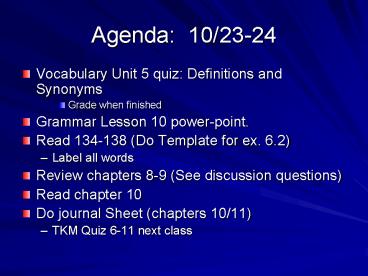Agenda: 102324 - PowerPoint PPT Presentation
1 / 17
Title:
Agenda: 102324
Description:
To Kill a Mockingbird 8-9 Discussion Questions. Who is Mr. Avery? ... To Kill a Mockingbird Discussion Questions 10-11. What is the main idea of chapter 10? ... – PowerPoint PPT presentation
Number of Views:77
Avg rating:3.0/5.0
Title: Agenda: 102324
1
Agenda 10/23-24
- Vocabulary Unit 5 quiz Definitions and Synonyms
- Grade when finished
- Grammar Lesson 10 power-point.
- Read 134-138 (Do Template for ex. 6.2)
- Label all words
- Review chapters 8-9 (See discussion questions)
- Read chapter 10
- Do journal Sheet (chapters 10/11)
- TKM Quiz 6-11 next class
2
Agenda 10/25
- Vocabulary definitions / antonyms
- Mark
- Grammar Lesson 10
- 1 block (templates)
- 4 block (power-point)
- Discussion questions 10/11 TKM
- Discuss
- Read Chapters 12 / 13 (12 together)
- Journal sheets
- Animal Farm Essay Due next class
3
Grammar Lesson 10
- Noun Clauses
4
Subordinating clause functions as an adverb
clause
5
Relative Clauses are adjective clauses
6
Noun Clauses
- A dependent clause that takes the place of a noun
in a sentence. - Whoever rang the doorbell has disappeared.
(subject) - The question was whether or not we should arrive
early. (subject complement / predicate noun) - I asked for help from whoever could afford a
donation. (object of preposition)
7
Noun Clauses
- A dependent clause that takes the place of a noun
in a sentence. - We wondered if the train had arrived.
- (direct object)
- You should give whoever buys the painting a
certificate of value. - (indirect object)
8
Noun Clauses
- A dependent clause that takes the place of a noun
in a sentence. - Sherry considered the bribe as what was
necessary. (object complement) - Your decision, when you should apply to graduate
school, is an important one.
9
Words that Introduce Noun Clauses
- Interrogatives
- Who, whoever, whom, whomever, what, whatever
(diagrammed as nouns) - Which, whose (diagrammed as adjectives)
- When, where, why, how, (diagrammed as adverbs)
- Expletives
- If, that, whether, whether or not (diagrammed
above the verb of the noun clause)
10
Grammar by diagram
- Read 134-138
- Do Template Sheet for Exercise 2
- Label all words
11
Don't forget that you have a dentist's
appointment this afternoon.
12
That man told me that that was the lure that
caught the big fish.
13
They wonder whether they should spend so much
money for a car.
14
To Kill a Mockingbird 8-9 Discussion Questions
- Who is Mr. Avery? What kind of person is he?
What does he tell the children about changing
weather? Why does Scout call the snowman that
looks like him a morphodite? - What happens to Miss Maudies house? How does
Boo Radley once again reach out to Scout? - Who is Tom Robinson? Who does Scout fight in
chapter nine? Why? What favor does Atticus ask
of Scout in regards to fighting? - Who is Aunt Alexandra? Francis? Describe their
characters? - Why does Scout suggest that Uncle Jack doesnt
know anything about children?
15
To Kill a Mockingbird Discussion Questions 10-11
- What is the main idea of chapter 10? Why does
Atticus never discuss his talent at shooting?
What does Miss Maudie say about Atticuss heart?
Is Tim Johnson a symbol? - Describe Miss Dubose? Why is she so cruel to Jem
and Scout? Why is it strange that Jem lost his
head? Why does Miss Dubose ask that Jem read to
her? Why does Atticus say she is brave?
16
Diagram these Sentences
- See Exercise 6.2 in Grammar by Diagram
17
Diagram these sentences
- Whatever you do will be appreciated (subject)
- This is exactly what I was looking for.
(predicate noun) - I understood why the play closed (direct object)
- He knew that he should buy his girlfriend
flowers. (direct object) - Some listeners said (that) Lincoln had a high
voice. (Direct object) - The committee gave a prize to whoever entered the
contest. (object of preposition) - Sherry considered the bribe as what was necessary
(object complement)









![get⚡[PDF]❤ Pocket Planner 2024-2025: Small 2-Year Monthly Agenda for Purse | 24 Months PowerPoint PPT Presentation](https://s3.amazonaws.com/images.powershow.com/10081698.th0.jpg?_=20240719098)
![[PDF] DOWNLOAD Agenda 2021: Poker, crâne | Janvier à Décembre 2021 | A PowerPoint PPT Presentation](https://s3.amazonaws.com/images.powershow.com/10095955.th0.jpg?_=20240811046)




















